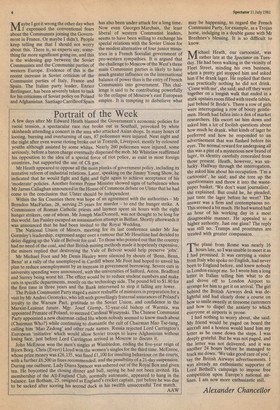Portrait of the Week
A few days after Mr Edward Heath blamed the Government's economic policies for racial tension, a spectacular race riot broke out in Southall, provoked by white skinheads attending a concert in the area who attacked Asian shops. In many hours of looting, burning and overturning of cars, 87 policemen were injured. Next night and the night after even worse rioting broke out in Toxteth, Liverpool, mostly by coloured youths although assisted by some whites. Nearly 260 policemen were injured, some seriously, before a baton charge eventually dispersed the mob. Mr Whitelaw reaffirmed his opposition to the idea of a special force of riot police, as exist in most foreign countries, but supported the use of CS gas.
Mr Heath appeared to oppose all the main planks of government policy, including its tentative reform of industrial relations. Later, speaking on the Jimmy Young Show, he indicated that he would fight and fight and fight again to achieve acceptance of his 'moderate' policies. Another former Prime Minister showed signs of turbulence when Mr James Callaghan announced in the House of Commons debate on Ulster that he had come to the conclusion that Ulster should be independent.
Within the Six Counties there was hope of an agreementwith the authorities — Mr Brendon MacFarlan, 28, serving 25 years for murder — to end the hunger strike. A Commission of Roman Catholic priests and laymen spent six hours with the eight hunger strikers, one of whom, Mr Joseph MacDonnell, was not thought to be long for this world. Ian Paisley escaped an assassination attempt in Belfast. Shortly afterwards it was announced that he had been invited to the Royal Wedding.
The National Union of Miners, meeting for its last conference under Mr Joe Gormley's leadership, expressed anger over a rumour that Mr Heseltine had decided to delay digging up the Vale of Belvoir for coal. To those who pointed out that the country had no need of the coal, and that British mining methods made it hopelessly expensive, the miners replied that destroying the Vale of Belvoir would help preserve 'jobs'.
Mr Michael Foot and Mr Denis Healey were silenced by shouts of 'Berm, Benn, Benn' at a rally of the unemployed in Cardiff where Mr Foot had hoped to unveil his plan to reduce unemployment by an increase in government borrowing. Severe cuts in university spending were announced, witftthe universities of Salford, Aston, Bradford and Surrey being worst hit. The effect would be to reduce student numbers and make cuts in specific departments, mostly on the technology side. The pound fell to $1.80 for the first time in three years and the Bank intervened to stop it falling any lower.
The Polish Communist Party staged a minor reshuffle of ministers in preparation for a visit by Mr Andrei Gromyko, who left with grovellingly fraternal assurances of Poland's loyalty to the Warsaw Pact, gratitude to the Soviet Union, and confidence in the Marxist-Leninist future. Mgr. Josef Glemp, 52-year-old bishop of Warmia, was appointed Primate of Poland, to succeed Cardinal Wyszynski. The Chinese Communist Party appointed a new chairman called Hu whom nobody seemed to know much about (Chairman Who?) while continuing to dismantle the cult of Chairman Mao Tse-tung, calling him 'Mao Zedong' and other rude names. Russia rejected Lord Carrington's European 'initiative' which would allow Soviet troops to leave Afghanistan without losing face, just before Lord Carrington arrived in Moscow to discuss it.
John McEnroe won the men's singles at Wimbledon, ending the five-year reign of Bjorn Borg. Chris (Evert) Lloyd won the women's singles for the third time. McEnroe, whose prize money was £26,135, was fined £1,100 for insulting behaviour on the courts, with a further £6,500 in fines recommended, and the possibility of a 21-day suspension. During one outburst, Lady Diana Spencer was ushered out of the Royal Box and given tea. He boycotted the closing dinner and ball, saying he had not been invited. His membership of the All-England Club, normally automatic, appeared to hang in the balance. Ian Botham, 25, resigned as England's cricket captain, just before he was due to be sacked after scoring his second duck in his twelfth unsuccessful Test match.
AAW


































 Previous page
Previous page